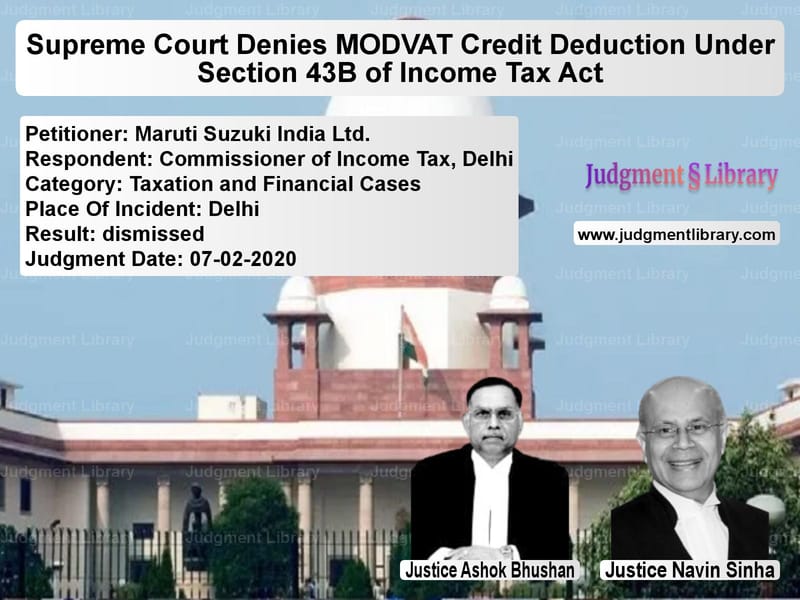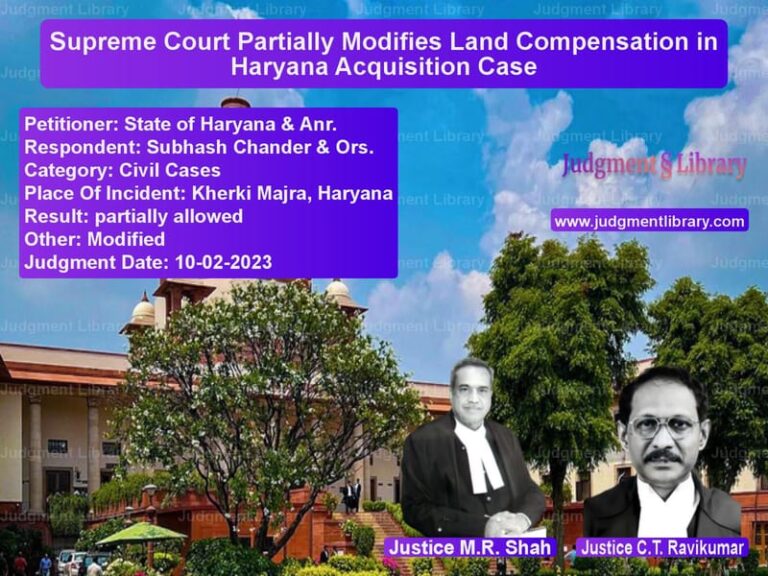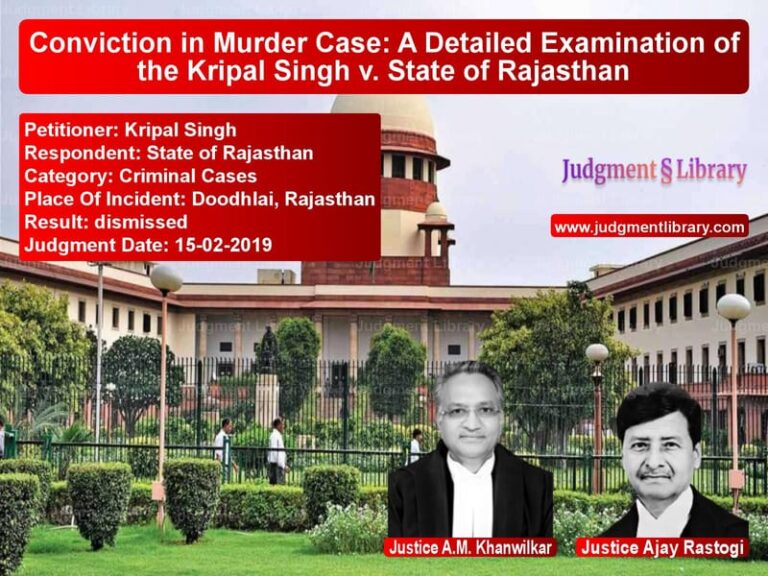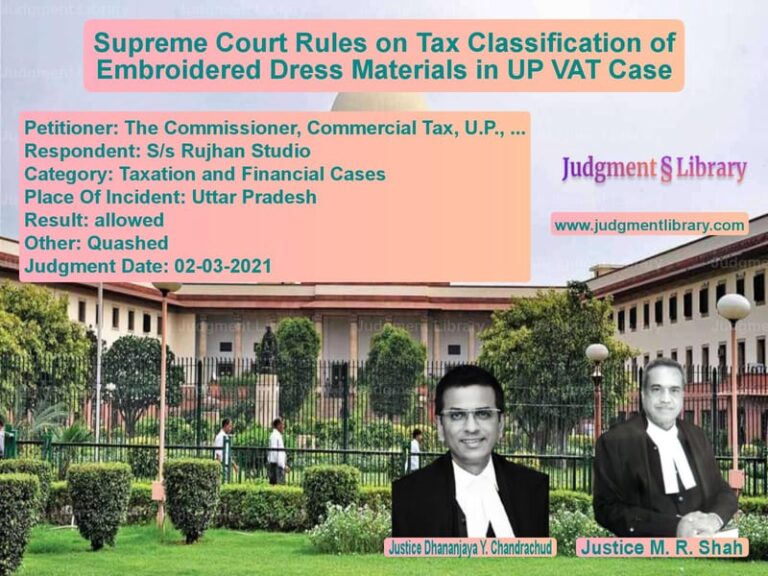Supreme Court Denies MODVAT Credit Deduction Under Section 43B of Income Tax Act
The case of Maruti Suzuki India Ltd. vs. Commissioner of Income Tax, Delhi is a landmark judgment where the Supreme Court ruled that unutilized MODVAT credit cannot be claimed as a deduction under Section 43B of the Income Tax Act. This ruling clarifies the taxation treatment of MODVAT credits and sales tax recoverable accounts.
Background of the Case
Maruti Suzuki India Ltd. (formerly known as Maruti Udyog Ltd.) challenged the Delhi High Court’s decision that upheld the disallowance of its claim for deduction of unutilized MODVAT credit and sales tax recoverable accounts. The appeals related to the assessment years 1999-2000 and 2000-2001.
The company, engaged in manufacturing and selling automobiles, had claimed deductions under Section 43B of the Income Tax Act for the following amounts:
- Rs. 69.93 crore as unutilized MODVAT credit.
- Rs. 3.08 crore under the sales tax recoverable account.
The Income Tax Appellate Tribunal (ITAT) and the Delhi High Court ruled against Maruti Suzuki, leading to the appeal before the Supreme Court.
Arguments of the Petitioner (Maruti Suzuki India Ltd.)
- The company argued that MODVAT credit is equivalent to an actual tax payment and should be allowed as a deduction under Section 43B.
- They contended that the amount of MODVAT credit is recorded in the government’s books and should be considered tax paid.
- The company also argued that even if MODVAT credit was not utilized in that particular financial year, it was effectively tax paid in advance.
- Regarding sales tax recoverable, they claimed that the amount had already been paid and should be deductible under Section 43B.
Arguments of the Respondent (Commissioner of Income Tax, Delhi)
- The Revenue argued that deduction under Section 43B applies only when the tax or duty is actually paid.
- MODVAT credit is not an actual tax payment but a credit that may be utilized later.
- Sales tax recoverable is merely an accounting adjustment and does not qualify as an actual payment.
- The law does not allow deductions for MODVAT credits unless they have been used to pay excise duty on finished goods.
Supreme Court’s Judgment
A bench comprising Justice Ashok Bhushan and Justice Navin Sinha ruled against Maruti Suzuki and upheld the decisions of the ITAT and the Delhi High Court.
“MODVAT credit is not an amount actually paid by the assessee. It is a credit available for future adjustment. Thus, it cannot be treated as a tax paid under Section 43B.”
The Court emphasized the principle that deduction under Section 43B is allowed only for sums that have been actually paid by the assessee.
“The fulfillment of conditions under Section 43B is necessary for allowing a deduction. The credit of excise duty earned under the MODVAT scheme is not a sum payable by the assessee.”
On the sales tax recoverable account, the Court held:
“Sales tax paid on raw materials does not automatically qualify for deduction. The sales tax recoverable is an accounting adjustment, not an actual payment.”
The Court dismissed Maruti Suzuki’s claim that MODVAT credit is equivalent to actual tax paid:
“Excise duty is payable only when finished goods are cleared. The liability to pay excise duty does not arise when MODVAT credit is earned.”
The Court also rejected the argument that MODVAT credit used in the subsequent financial year should be deductible in the previous year:
“The crucial words in Section 43B are ‘sum payable by the assessee by way of tax, duty, cess, or fee.’ MODVAT credit is not a sum actually paid by the assessee.”
Thus, the Supreme Court upheld the Revenue’s stance and confirmed that MODVAT credit and sales tax recoverable cannot be claimed as deductions under Section 43B.
Key Takeaways from the Judgment
- MODVAT credit is not an actual payment: It is merely a credit available for future use and does not qualify for deduction under Section 43B.
- Deduction requires actual payment: Section 43B applies only when a tax or duty has been actually paid.
- Sales tax recoverable is not deductible: The sales tax recoverable account is an accounting adjustment and does not qualify for deduction.
- Legal certainty on MODVAT credit deductions: This ruling provides clarity on how MODVAT credits are treated under income tax laws.
Impact of the Judgment
This ruling has significant implications for businesses utilizing MODVAT credits:
- It ensures that deductions under Section 43B apply strictly to amounts actually paid.
- It prevents businesses from claiming deductions based on unutilized credits.
- It reinforces the principle that tax exemptions and deductions must be explicitly provided in law.
The judgment sets a precedent for tax disputes involving MODVAT credit and sales tax recoverable accounts.
Conclusion
The Supreme Court’s decision in Maruti Suzuki India Ltd. vs. Commissioner of Income Tax, Delhi reinforces the principle that MODVAT credits cannot be claimed as deductions under Section 43B. The ruling provides much-needed clarity on tax treatment and ensures that businesses cannot claim deductions on credits that have not been utilized. By upholding the Revenue’s stance, the Court has affirmed the strict interpretation of tax laws and the requirement for actual payment before claiming deductions.
Petitioner Name: Maruti Suzuki India Ltd..Respondent Name: Commissioner of Income Tax, Delhi.Judgment By: Justice Ashok Bhushan, Justice Navin Sinha.Place Of Incident: Delhi.Judgment Date: 07-02-2020.
Don’t miss out on the full details! Download the complete judgment in PDF format below and gain valuable insights instantly!
Download Judgment: Maruti Suzuki India vs Commissioner of Inco Supreme Court of India Judgment Dated 07-02-2020.pdf
Direct Downlaod Judgment: Direct downlaod this Judgment
See all petitions in Income Tax Disputes
See all petitions in Tax Refund Disputes
See all petitions in Customs and Excise
See all petitions in Banking Regulations
See all petitions in Judgment by Ashok Bhushan
See all petitions in Judgment by Navin Sinha
See all petitions in dismissed
See all petitions in supreme court of India judgments February 2020
See all petitions in 2020 judgments
See all posts in Taxation and Financial Cases Category
See all allowed petitions in Taxation and Financial Cases Category
See all Dismissed petitions in Taxation and Financial Cases Category
See all partially allowed petitions in Taxation and Financial Cases Category







